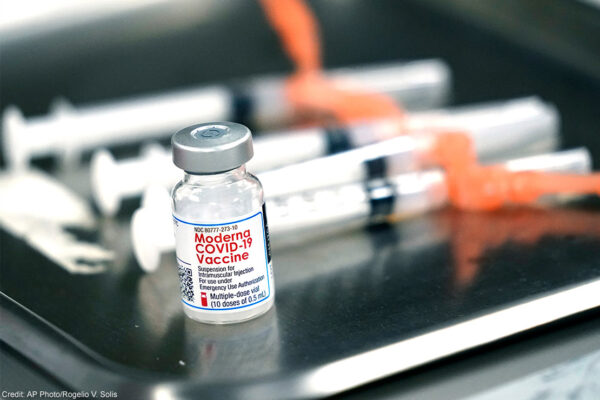Editor’s Note: An earlier version of this post stated Colorado Governor Polis walked back his statement that incarcerated people shouldn’t be prioritized for vaccination. The governor did no such thing and the post has been updated to reflect this. We continue to urge the governor to reconsider and protect the rights of everyone in his state, including the incarcerated.
Governor Jared Polis of Colorado — otherwise a trailblazer when it comes to criminal legal reform — recently said, “There’s no way [the COVID-19 vaccine] is going to go to prisoners before it goes to the people who haven’t committed any crime.” Governor Polis’ instinct to throw incarcerated people under the bus is sadly typical, and we shouldn’t allow sentiments like that to poison the national discussion around vaccine access and distribution.
Following the U.S. Food and Drug Administration’s approval of a COVID-19 vaccine, the critical question for lawmakers — who should get the vaccine first — is still roiling. As with anything important, the devil is in the details. And in this instance, the details can determine life or death for thousands of incarcerated individuals.
Protecting them is a matter of science, law, and basic humanity.
Let’s start with science. Carceral settings have consistently been listed among the top coronavirus hotspots and the source of much suffering and death because they are too crowded and unhygienic to allow for social distancing. The death rate in prisons has been three times that of the general population. The infection rate of COVID-19 among those in immigration detention between May and August was 13 times higher than that of the general the rate of the U.S. population.
Individuals living in carceral settings also have higher rates of disability and chronic health issues that heighten their risk of severe illness or death from COVID-19. As just one illustration, public health experts note that incarcerated people should be treated as though they are 10 to 15 years older than their biological age. These vulnerabilities are due in part to the physical stress and strain imposed by their imprisonment. Prior to COVID-19, these facilities already denied detainees access to adequate nutrition, health care, hygienic supplies, and fresh air — a situation worsened by a woefully harmful and inadequate response to the pandemic.
Prison, jail, and detention administrators have consistently failed to take the necessary steps to prevent outbreaks that endanger both the people inside and outside their facilities, as the virus does not stop at the prison walls. Staff and contractors churn in and out constantly, allowing the virus to spread both within the facility and in the broader community. As a result, dozens of public health experts have supported lawsuits and advocacy by the ACLU and other organizations to increase protective measures and significantly reduce incarcerated populations. Just last week we won an order to cut the Orange County jail population in half, because social distancing was impossible without it. The science-driven arguments apply equally to vaccine distribution: The faster we get vaccines into detention settings, the faster we can protect everyone, both inside and out.
The law also supports the science. The Constitution protects individuals who are incarcerated and therefore unable to protect themselves. To that end, government officials must take reasonable efforts to protect those in their custody from becoming infected with COVID-19. Nothing is more reasonable than vaccinating the most vulnerable populations first, wherever they live. The fact that incarcerated people may be fighting for asylum, or have been convicted or accused of a crime, is irrelevantto the analysis here, and it should be.Now more than ever, federal and state officials must honor their oaths to these constitutional principles. Lives are at stake.
Finally, this is about basic humanity. COVID-19 has disproportionately decimated the poor, the medically vulnerable, people with disabilities, and Black and Brown communities, including immigrants. Many people fall into several of these categories at once, and far too many find themselves incarcerated — often because of this country’s legacy of systemic racism. Already at increased risk of infection, many are also at the mercy of their government to protect them. And, so far, governments have largely failed.
But because of ACLU litigation and advocacy, criminal defendants now have the right to remain silent and the right to a court-appointed attorney. We fought the racist war on drugs in the 1980s and have never stopped. We are ending the caging of migrant children nationwide. Our work since March protecting the nation’s most vulnerable from COVID-19 is a continuation of this legacy. Today, we are proud to say that people in prisons, jails, and immigration detention — along with people with disabilities and seniors in congregate settings, communities of color, and other vulnerable groups who have been most impacted by the pandemic — should be a first-tier priority for the COVID-19 vaccine.

